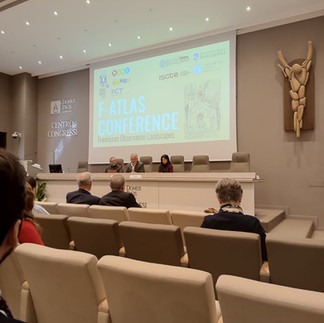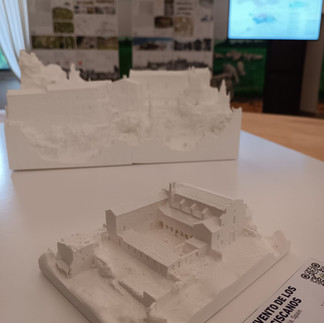11-13.05.2023 || F-ATLAS CONFERENCE — FRANCISCAN OBSERVANCE LANDSCAPES
- f-atlas
- May 31, 2023
- 3 min read

From May 11th to May 13th, 2023, Assisi's Domus Pacis became a hub of intellectual exchange and exploration as scholars from around the world gathered for the F-ATLAS Conference — Franciscan Observance Landscapes. Organized by S. Bertocci - University of Florence, S. Genin - ISCTE-IUL University of Lisbon, M. Soler Sala - University of Barcelona, M . Filomena Andrade - UCP-CEHR Universidade Católica Portuguesa, the conference aimed to shed light on the historical, religious, and technological aspects of Franciscan Observance and religious Cultural Heritage. With 96 participants and 48 thought-provoking contributions, the event showcased a diverse range of perspectives from esteemed researchers and academics representing universities across Italy (Florence, Perugia, Siena, Molise, Basilicata, L'Aquila, Pavia, Bolzano, Napoli, Campania, Venezia), Spain (Barcelona, Sevilla, Valencia, Santiago de Compostela, Valladolid), Portugal (Lisbon, Porto), as well as Belgium, Colombia, and Brazil.
The F-ATLAS Conference brought together experts from various disciplines, including history, architecture, theology, and technology, creating a rich and comprehensive dialogue. Participants from renowned Italian universities, alongside international scholars, offered unique insights into the Franciscan Observance and its impact on European Cultural Heritage.
Historical investigations formed a significant part of the conference, with presentations focusing on the documentation of Franciscan Observance and religious Cultural Heritage. Researchers delved into the evolution of Franciscan convents, examining their organization over the centuries and their intricate relationship with local territories and cultures. Through meticulous archival research and critical analysis of existing literature, these contributions painted a vivid picture of the historical context in which the Observance movement flourished.
One of the highlights of the F-ATLAS Conference was the emphasis on leveraging cutting-edge technologies for architectural analysis. Presentations showcased the transformative potential of drones, laser scanners, photogrammetry, augmented reality/virtual reality (AR/VR), Geographic Information Systems (GIS), and 3D printing in documenting and preserving religious architectural heritage. These innovative tools provided researchers with new ways to capture, analyse, and present architectural data, enabling a deeper understanding of the complex structures and landscapes associated with Franciscan Observance.
The F-ATLAS Conference fostered international collaboration, with participants hailing from a diverse range of countries and backgrounds. International scholars brought their unique perspectives to the discussions, enriching the exploration of Franciscan Observance beyond European borders. This global engagement highlighted the universal significance of religious cultural heritage and the need for international cooperation in its preservation.
The F-ATLAS Conference not only examined the past but also sparked discussions on the future of documenting and safeguarding religious heritage. The integration of historical research with technological advancements opened up exciting possibilities for creating comprehensive digital archives, virtual reconstructions, and immersive experiences that can bridge the gap between the past and the present.
The F-ATLAS Conference was a captivating and enlightening gathering that united scholars, researchers, and academics in their shared passion for Franciscan Observance and religious Cultural Heritage. Through a multidisciplinary approach and the integration of new technologies, the conference fostered a deeper understanding of the historical context and architectural intricacies of the Observance movement. As the legacy of the conference continues to inspire future research, it is clear that the F-ATLAS Conference has made significant contributions to the preservation and appreciation of religious heritage worldwide.
In addition to the stimulating discussions and presentations, the F-ATLAS Conference featured an Exhibition, illustrating the culmination of the Project's extensive research and exploration. Complementing the scholarly discussions and presentations, the Exhibition provided a tangible experience, allowing conference participants to delve into the project's findings in a visually captivating manner, through a series of graphic panels, immersive videos — from sweeping aerial views captured by drones to meticulously scanned and reconstructed sites — and detailed 3D-printed models.
This interactive display captivated the senses, making complex concepts accessible and fostering a deeper connection with the subject matter. It showcased the power of visual storytelling in conveying the depth and significance of the project's findings.
You can watch the Conference streaming on our YouTube channel:
























Comments